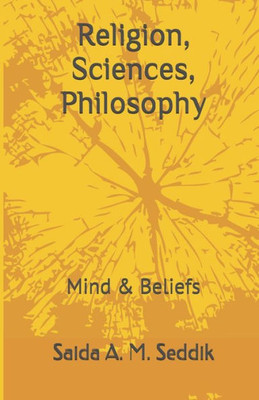
Religion, Sciences, Philosophy: Mind & Beliefs
Independently published
ISBN13:
9781520364131
$14.49
To believe or not to believe. Do we need to believe as human being, as a society, as a nation; this implies the question: do we need to have beliefs and fight for them using weapons causing tremendous wars, or using books, debates, and speeches to honor and win our beliefs. Moreover, when I say believers I imply non believers as themselves fight to honor their beliefs that is doubting others beliefs. To believe or not to believe is not a personal decision that a human being could take as position regardless of many circumstances that play a great role in such decision. From reading some parts of the Book Quran we could read that human being has the right to believe or not to believe in the great power that is the creator called ALLAH, God, or Lord; this right is given to him as philosophy of existence, however it's not given as a social nor political right. In fact it is commendatory to believe and embrace the same beliefs the society has agree on in many roles applied in constitution, institutions, and order laws. In his book "the end of faith" Sam Harris considered the Books as cause of distortion and eradication of humanity causing wars. He has doubted the Books while he supposed to question the people' lack of understanding the purpose of the Books. He stated, it seems that if our species ever eradicates itself through war, it will not be because it was written in the stars but because it was written in our books; it is what we do with words like "God" and "paradise" and "sin" in the present that will determine our future. Our situation is this: most of the people in this world believe that the Creator of the universe has written a book. We have the misfortune of having many such books on hand, each making an exclusive claim as to its infallibility. People tend to organize themselves into factions according to which of these incompatible claims they accept--rather than on the basis of language, skin color, location of birth, or any other criterion of tribalism. Each of these texts urges its readers to adopt a variety of beliefs and practices, some of which are benign, many of which are not. Nevertheless the real scenario is this: most of the people in this world doesn't read thoroughly nor put to practice the principles stated in the Book. The beliefs that most people carry on are not founded from the book but rather from some powerful personalities' understanding and interpretation. Beliefs have been part of education done by parents' understanding, by churches, by Masjids, or by Synagogues interpretations. Beliefs are more embedded culturally in societies, they are based on social and cultural values, this is why beliefs differ from a person belonging to middle class to another one belonging to worker class. As beliefs are part of cultural features this is why the middle class behavior and norms distinguish from the worker social class. Moreover, beliefs would change upon the understanding of the principles and values pulled out of the Book done first by scholars then law makers. Scholars would use different methods of interpretation which are mostly related to religious, political, social, and economic power; who has more power in society has the right to impose its own understanding of the Book. Thus, sociology has had some complicity in this alteration; to a certain extent, popularization of the sociological perspective on religion has had the effect of altering the nature of religion itself. The social sciences, as heirs to Enlightenment humanism, have interpreted religion as a human construction, undermining its claims to transcendence. Some recent sociologists have called attention to this perspective and questioned whether the social sciences can validly claim to be value-free if their very choice of an interpretive stance implies certain value judgments. They ask whether it is possible to have a social science of religion that allows for the truth of religion.
- | Author: Saida A. M. Seddik
- | Publisher: Independently published
- | Publication Date: Jan 12, 2017
- | Number of Pages: 229 pages
- | Language: English
- | Binding: Paperback/Philosophy
- | ISBN-10: 152036413X
- | ISBN-13: 9781520364131
- Author:
- Saida A. M. Seddik
- Publisher:
- Independently published
- Publication Date:
- Jan 12, 2017
- Number of pages:
- 229 pages
- Language:
- English
- Binding:
- Paperback/Philosophy
- ISBN-10:
- 152036413X
- ISBN-13:
- 9781520364131





